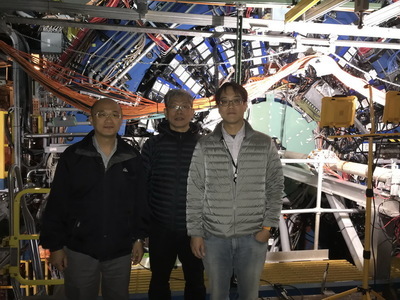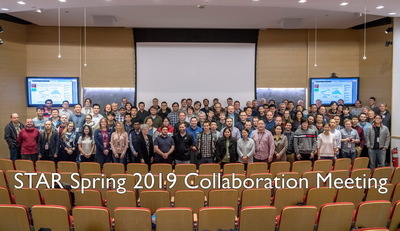Exploring the Big Bang: NCKU Takes Part in STAR Experiment at Brookhaven National Laboratory


In the past, black holes only existed in theories and our imaginations. With the release of the first images ever taken of a black hole, it is clear that there are even more mysteries in nature and the universe waiting for us to prove and understand them. Another direction that physicists are actively exploring is the Big Bang, which is associated with the beginning of the universe, and what took place during the Big Bang. The STAR (Solenoidal Tracker at RHIC) Experiment at Brookhaven National Laboratory (BNL), of which NCKU is a long-time participant, focuses on this very thing. The STAR experiment is one of the most significant heavy-ion collision experiments in the world. Its main purpose is to study quantum chromodynamics and the properties of quark-gluon plasma so as to gain a deeper understanding of what happened in the moments after the Big Bang.
Over 600 scientists and engineers from 14 countries are involved with the STAR experiment, working together to explore more basic physical phenomena in nature. A forward tracking detector upgrade project is currently underway, and an NCKU research team was invited to the US to attend a project meeting. The American collaborators were very satisfied with the progress made by NCKU and expressed their hope that once the upgrade project is completed, NCKU will also take part in BNL’s major electron-ion collider project, which will commence in 2030.
In the forward tracking detector upgrade project, Assistant Professor Yi Yang at the Department of Physics at NCKU is in charge of designing and analyzing the mechanical structure and manufacturing and testing the sensors for the forward tracking upgrade, all of which are crucial parts of the upgrade project. Yi Yang described the purpose of the upgrade as akin to widening a small window to see more of the outside world.
The STAR detector generates a substantial amount of heat during operations and thus requires a highly efficient cooling system and sophisticated composite material structures to prevent high temperatures from causing thermal deformation and affecting the precision of experiments. Yi Yang invited Assistant Professor Chung-De Chen from the Department of Mechanical Engineering at NCKU to join the research team and assist in thermal and stress analyses. He also brought in the Aerospace Industrial Development Corporation (AIDC) to provide professional composite material manufacturing experience and technology.
Yi Yang, Chung-De Chen, and AIDC senior engineer Yung-Ruey Chung went to the US to attend the project meeting from late March to early April at the invitation of STAR Collaboration spokesperson Professor Zhangbu Xu. They discussed project details with research teams involved in the STAR experiment face to face, including their progress on the design and analysis of the detector’s mechanical structure and whether their design methods meet requirements. NCKU’s report was met with high praise. The STAR detector upgrade project is expected to finish in three years. BNL has revealed that they plan to launch another major project, an electron-ion collider, in 2030 to explore the basic properties of protons and other nuclei, and they hope that NCKU will take part in it as well.
BNL is one of the top facilities for high-energy nuclear physics research in the world. Many elementary particles were discovered at BNL. Yi Yang indicated that NCKU’s long-time participation can not only increase NCKU’s international visibility but also give students the opportunity to experience first-class experiments and enhance NCKU’s capacity for experiments in high energy physics. Actual accomplishments will make NCKU more qualified to take on major foreign and domestic research projects, strengthen NCKU’s college of engineering, and create closer and exemplar industry-university relationships for the co-completion of major international projects.
Yi Yang served as a post-doctoral researcher in the STAR experiment in 2014. Upon his return to Taiwan, he came to teach at the Department of Physics at NCKU but continued to lead research teams taking part in the STAR experiment. The NCKU research team became an official member of the STAR Collaboration in 2015, and for years, the team has sent many doctoral and postgraduate students to BNL, where they work 24-hour shifts collecting data and participate in discussions and research. Their performance has received praise from American collaborators. This prompted 2019 NCKU and the STAR Collaboration at BNL to sign a memorandum of understanding in which STAR will provide NCKU students with accommodation and cover some of their living expenses and BNL researchers will offer guidance to NCKU students as well.
Over 600 scientists and engineers from 14 countries are involved with the STAR experiment, working together to explore more basic physical phenomena in nature. A forward tracking detector upgrade project is currently underway, and an NCKU research team was invited to the US to attend a project meeting. The American collaborators were very satisfied with the progress made by NCKU and expressed their hope that once the upgrade project is completed, NCKU will also take part in BNL’s major electron-ion collider project, which will commence in 2030.
In the forward tracking detector upgrade project, Assistant Professor Yi Yang at the Department of Physics at NCKU is in charge of designing and analyzing the mechanical structure and manufacturing and testing the sensors for the forward tracking upgrade, all of which are crucial parts of the upgrade project. Yi Yang described the purpose of the upgrade as akin to widening a small window to see more of the outside world.
The STAR detector generates a substantial amount of heat during operations and thus requires a highly efficient cooling system and sophisticated composite material structures to prevent high temperatures from causing thermal deformation and affecting the precision of experiments. Yi Yang invited Assistant Professor Chung-De Chen from the Department of Mechanical Engineering at NCKU to join the research team and assist in thermal and stress analyses. He also brought in the Aerospace Industrial Development Corporation (AIDC) to provide professional composite material manufacturing experience and technology.
Yi Yang, Chung-De Chen, and AIDC senior engineer Yung-Ruey Chung went to the US to attend the project meeting from late March to early April at the invitation of STAR Collaboration spokesperson Professor Zhangbu Xu. They discussed project details with research teams involved in the STAR experiment face to face, including their progress on the design and analysis of the detector’s mechanical structure and whether their design methods meet requirements. NCKU’s report was met with high praise. The STAR detector upgrade project is expected to finish in three years. BNL has revealed that they plan to launch another major project, an electron-ion collider, in 2030 to explore the basic properties of protons and other nuclei, and they hope that NCKU will take part in it as well.
BNL is one of the top facilities for high-energy nuclear physics research in the world. Many elementary particles were discovered at BNL. Yi Yang indicated that NCKU’s long-time participation can not only increase NCKU’s international visibility but also give students the opportunity to experience first-class experiments and enhance NCKU’s capacity for experiments in high energy physics. Actual accomplishments will make NCKU more qualified to take on major foreign and domestic research projects, strengthen NCKU’s college of engineering, and create closer and exemplar industry-university relationships for the co-completion of major international projects.
Yi Yang served as a post-doctoral researcher in the STAR experiment in 2014. Upon his return to Taiwan, he came to teach at the Department of Physics at NCKU but continued to lead research teams taking part in the STAR experiment. The NCKU research team became an official member of the STAR Collaboration in 2015, and for years, the team has sent many doctoral and postgraduate students to BNL, where they work 24-hour shifts collecting data and participate in discussions and research. Their performance has received praise from American collaborators. This prompted 2019 NCKU and the STAR Collaboration at BNL to sign a memorandum of understanding in which STAR will provide NCKU students with accommodation and cover some of their living expenses and BNL researchers will offer guidance to NCKU students as well.
Provider:
news center
Date:
2019-05-01




